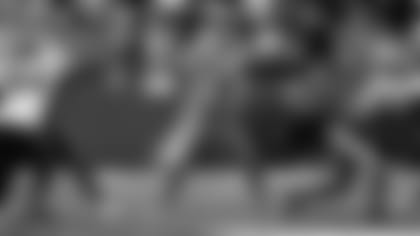The Detroit Lions' last chance to kick a tying field goal or score a winning touchdown in Sunday's 30-27 loss to the San Francisco 49ers officially ended with two incomplete passes meant for Theo Riddick.
First was a short pass on third down that Riddick dropped at midfield. It would at least have given the Lions a first down – with the possibility that Riddick could have made a tackler miss with one of his many moves to turn the play into a big gain.
Next was a fourth-down pass down the left sideline that Matthew Stafford threw while scrambling to his left. It also was incomplete. The 49ers took over with 14 seconds left and ran one play to run out the clock and celebrate their first win of the year. The Lions were left to ponder what might have been -- and wasn't.
What we learned Sunday is that what officially crushed the Lions' chances to win – incomplete passes on their final two plays – were really two plays that were the last links in a chain of missed opportunities or misplays.
There are big and small plays throughout any game that individually or strung together can be looked back on as ultimately making a difference in how they add and subtract points, as well as impacting field position and situations.
The last two incomplete passes stood out Sunday because of the finality. They sealed the verdict in the 49ers' favor.
Here are four examples of what we learned Sunday about the impact on games that in some cases might not be immediately apparent:
The fumble: Matthew Stafford lost one in the second quarter that didn't seem like a big deal at the time. On a third and one in the second quarter, Stafford tried to keep the play alive as he scrambled away from the 49ers' pass rush. He was hit and fumbled, and the 49ers' recovered at the Lions' 16.
Bottom line: The fumble recovery let the 49ers begin their possession deep in field-goal territory. The Lions' defense held, sacking Jimmy Garoppolo on third down, but the 49ers cashed in with a field goal.
The three points they got represented the final margin of victory.
Penalty/penalty: The 49ers scored a touchdown on the first possession of the second half to extend their lead to 20-10.
Jamal Agnew's 45-yard kickoff return let the Lions start their possession at their 48, and in three plays they had first down at the 49ers' 18. Holding penalties called on Taylor Decker and Frank Ragnow on consecutive plays wiped out a three-yard run by LeGarrette Blount and a 10-yard catch by Riddick
Instead, it was first and 27 at the 35. The Lions settled for a field goal when they were in position to convert Agnew's return into a touchdown.
Bottom line: There was no guarantee that the Lions would convert Agnew's return into a touchdown, but Stafford and his receivers were getting hot at the time. The opportunity was minimized by the penalties.
Overcoming: The Lions did something bad and good.
Another big return by Agnew, this one 73 yards to the end zone with a punt – only to have it called back on two flags for illegal blocks.
The Lions overcame it with a 79-yard drive that took 12 plays. Stafford hit tight end Michael Roberts with a 15-yard pass in the end zone that cut the deficit to 30-27 – the final score. Roberts' catch came on a third and 15, after Stafford had taken a sack on second down.
Bottom line: The TD drive made up for having Agnew's return wiped out by a penalty. However, it also took almost three minutes off the clock – valuable time the Lions could have used in their final possession to mix run and pass plays.
After they got the ball for their last possession with 1:08 left, all seven plays were passes.
Flag, Lions seeing red: It looked like a dream comeback when rookie defensive back Tracy Walker stepped in front of a pass by Garoppolo for an interception and a return inside the 49ers' 10-yard line.
With 2:14 left, and the passing game clicking, the Lions were certain to at least tie the game with a field goal and likely take the lead with a touchdown.
That did not happen. An official on the other side of the field threw a flag for holding on Quandre Diggs.
I get Diggs' point that his play had nothing to do with Walker's pick. However, former NFL head of referees Mike Pereira said on the Fox network telecast that he had no problem with the calls. Officials are assigned to certain areas, and they make calls on what they see in that area – not what happens on the other side of the field.
It was an untimely call on a good player, but it was an enforcement of the rules. That made it the right all.
Bottom line: The call stood out because of the timing – late in the game, with the potential to change the outcome.
But what we learned is that there are plays and penalties that make an impact from start to finish.














